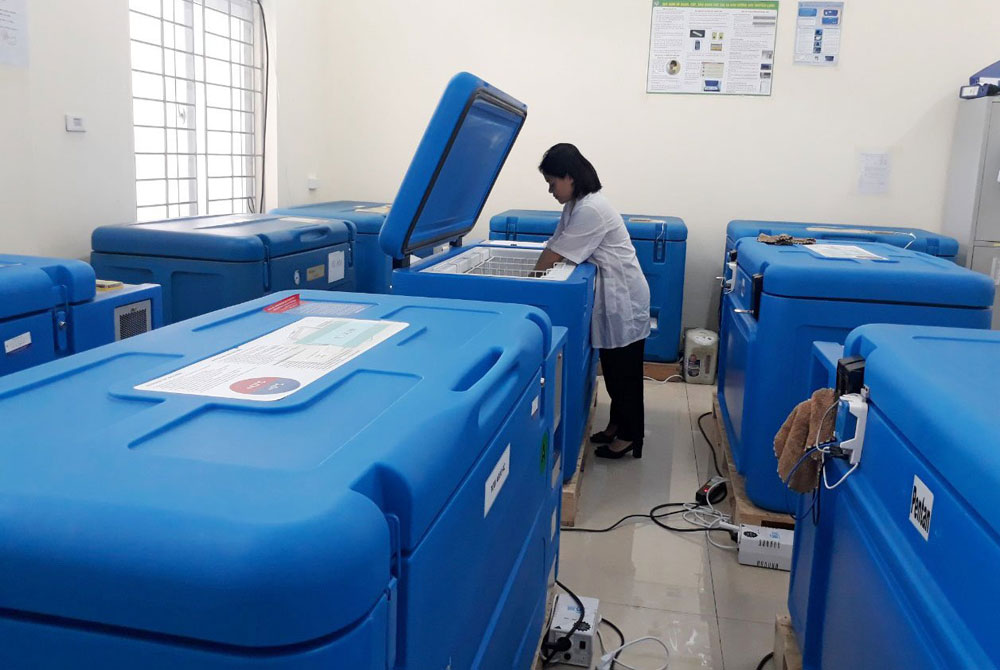
(HBO) - The Provincial Center for Disease Control (CDC) has received 5,100 doses of Covid-19 vaccine from AstraZeneca, which is the second batch of Covid-19 vaccine distribution supported by the COVAX Facility Program. Currently, these vaccines have been checked by CDC and stored in safe storage. Vaccines are stored in cold chain warehouses meeting the standards set by the Ministry of Health and World Health Organization (WHO). In order for the vaccination to be highly effective and safe, CDC has developed a plan to distribute vaccines and the equipment for vaccination to 12 units in the province.
 5,100 doses of Covid-19 AstraZeneca vaccine received for the second batch
are stored at the vaccine warehouse of the Provincial Center for Disease
Control.
5,100 doses of Covid-19 AstraZeneca vaccine received for the second batch
are stored at the vaccine warehouse of the Provincial Center for Disease
Control.
The Ministry of Health has directed to implement the vaccination
immediately upon receipt of the vaccines in accordance with the Government's
Resolution No. 21 / NQ-CP of February 26th, 2021, and it must be completed
before May 15th, 2021 (for those who have had the first vaccination according
to Decision No. 1469 / QD-BYT, dated March 6th, 2021 of the Ministry of Health,
they will deploy the second injection when there is 4 weeks or more from the
date of first injection).
Hoa Binh province is undergoing a dynamic transformation amid Vietnam’s national digital transition. Building on Poliburo’s Resolution No. 57-NQ/TW on breakthroughs in science, technology, innovation, and national digital transformation, the province has rolled out a wide range of practical action plans. A standout initiative is the "Digital Literacy for All” movement, an effort to ensure that no one is left behind in the digital era.
Hoa Binh province is undergoing a dynamic transformation in the wake of the national digital transformation movement. Building on Resolution No. 57-NQ/TW of the Politburo on breakthroughs in science, technology, innovation, and national digital transformation, the province has implemented a wide range of practical action plans. A standout initiative is the "Digital Literacy for All” movement ambitious effort to ensure that no one is left behind in the digital age.
With a spirit of unity and proactive problem-solving, the Party Committee, the government and the people of Dong Lai Commune (Tan Lac District) have made great strides in implementing the resolutions of the 24th Party Congress of the commune for the 2020 - 2025 term. Focusing on leadership and practical actions, the commune has brought the Party’s resolutions into daily life, creating strong impacts and pushing the local development forward.
Amid the nationwide push for digital transformation, young people in Hoa Binh Province are stepping up as dynamic pioneers, applying technology to enhance Youth Union operations and expand the reach of youth-led initiatives. Through creativity and adaptability, Youth Union organizations at all levels have introduced a series of practical solutions, contributing to modern governance and community development.
In recent years, An Nghia commune, located in Lac Son district, has stepped up administrative reform, focusing on improving the quality and efficiency of its single-window service unit for receiving and processing administrative procedures. These improvements have helped create favourable conditions for local residents and organisations to handle administrative procedures, contributing to the commune’s broader socio-economic development.
The Prime Minister-approved master plan to develop the multi-use value of forests ecosystems through 2030, with a vision to 2050, aims to improve the management and sustainable use of forest resources, create jobs, increase incomes, and improve the living standards of ethnic minorities, people in mountainous and remote areas, forest workers and those living near forests.



 5,100 doses of Covid-19 AstraZeneca vaccine received for the second batch
are stored at the vaccine warehouse of the Provincial Center for Disease
Control.
5,100 doses of Covid-19 AstraZeneca vaccine received for the second batch
are stored at the vaccine warehouse of the Provincial Center for Disease
Control.